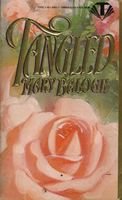
Having loved Mary Balogh's Longing, I went looking for anything else she wrote around that time (1994). I came up with two Topaz books from 1993, and I was able to get one of them, Tangled, soon thereafter.

As you can see, the front cover is pretty boring and unoffensive, but open the book and ta-dah! I'm half-tempted to glue the stepback closed. David would not be so stupid as to run into battle with his coat like that!
ONE MAN HAUNTED HER PAST...I'm not completely sure of how I should rate this book. In this blog, I rate books purely for my enjoyment of them, and as such, this one gets a B-. Objectively, though, I thought it was much better than that.
Her beautiful eyes flashing with hate, Rebecca faced Lord David Tavistock. He had come back, wounded but still vibrantly, sensually alive, from the Crimean War. Julian Cardwell, her sweet, gentle bridegroom--and David's foster brother--had not. She blamed wild, reckless David for Julian's decision to enter the Queen's Guards, and for the devastating loss of her perfect young husband, whose memory even now broke her heart and filled her dreams.
ONE PROMISED HER A FUTURE...
His blue eyes shadowed by dark secrets, David had come to claim the woman he had always loved. All his life he had protected the charming Julian, hiding the truth from Rebecca about the women Julian dallied with, the child he had fathered, the scandalous way he died. Now David offered Rebecca a life of privilege and wealth--as hiswife. She wanted a marriage of convenience, but he intended to awake her deepest passions, to make her forget Julian Cardwell...and to find in hisbed all the ecstasy of a man's true love.
The story of Lord David Tavistock and Rebecca Cardwell has a lot of backstory to it. When David was a young boy, his father took in a distant relative, orphan Julian Cardwell, and the two boys grew up together. David was always a serious, responsible boy, while Julian constantly misbehaved, and his pranks weren't exactly harmless. I mean, he wasn't a little serial killer, either, but some of his mischief had a definite touch of cruelty to it.
David always felt a bit sorry for Julian, and secretly feared that his father might kick him out if he found out the things he did, so David kept taking responsibility for Julian's misbehaviour. It became a habit for him, and one that continued until adulthood.
Growing up near David and Julian was neighbour Rebecca, and both boys were attracted to her. Both her and David's father intended for David and Rebecca to marry, but the solemn, dutiful Rebecca came to despise David for the cruelty of some of his pranks, and so she feel in love with Julian and married him.
David knew perfectly well what had happened, but even this wasn't enough for him to change his behaviour and insist that Julian finally take responsibility for his actions. When barely a few weeks before Julian and Rebecca's wedding one of the neighbours turns up pregnant by Julian, rather than insist that Rebecca know about it and make a well-informed decision about whether she wants to go through with the marriage, David steps up yet again and allows it become commonly known that the child is his. David believes it was just a lapse on Julian's part, and that he will be a good and faithful husband, just as he promises.
As the book starts, however, it's clear that Julian's not a good and faithful husband. Rebecca is completely oblivious to this, but David is absolutely appalled by Julian's constant tomcatting and has come to realize that, no matter how much the man promises that it meant nothing, that it won't happen again, and blah, blah, blah, it's his promises that mean nothing.
Both David and Julian are officers in the army (Julian joined just because David did, and he couldn't allow David to one-up him!), and when the Crimean war starts, both of them are called to duty. But only David comes back, and Rebecca blames him for it. Rebecca doesn't know how right she is to blame David, as Julian didn't really die under enemy fire. He'd been having an affair with a fellow officer's wife, and when David came across him trying to kill the cuckolded husband in the middle of battle, he was forced to kill his best friend.
David obviously comes home full of guilt, and this guilt is only exacerbated when he realizes that Rebecca has been left in an untenable position by her husband's death. He proposes a marriage of convenience to her, and after her initial outrage, she accepts. David really has no hope that she might come to love him, but he loves her too much to leave her to a miserable existence. A marriage to him will at least give her life purpose, as his estate is in dire need of management, and she'll have her hands full getting the house in shape again.
What made this book so good, and at the same time so difficult for me to enjoy, was the character of Rebecca. Rebecca was a woman completely of her time, a woman who's completely taken into herself the rules under which she's been raised. She's been raised to believe a woman's entire existence should center around pleasing her husband, no matter what he wants her to do, so by god, she behaves that way. If her husband wants to make her life hell, it's his right to do so, and she will endure. In this sense, she reminded me a bit of Leda, from Kinsale's The Shadow And The Star. Wonderfully done character, but one I could intellectually understand, but not really like.
Seeing David and Rebecca together was both heartbreaking and, at the beginning, frustrating. In those sections, I almost hated Rebecca for treating David the way she did, because he was such a good guy. But really, it was his own fault for allowing Julian to use him as a scapegoat and for prefering to keep Julian's memory untouched rather than tell her the truth. I mean, given what he allowed Rebecca to think, it was justified that she would despise him. This meant that at times I just lost patience with the whole wretched situation and ended up disliking them both!
Things improved as the book went on, however, and once some time passed, I loved seeing David and Rebecca starting to build a relationship. I found it especially interesting how Balogh used what happened in the marriage bed to move their relationship forward. Rebecca's initial attitude there is of the "close your eyes and think of England" variety. She'll do her duty, no matter how unpleasant she always found it even with Julian, whom she loved. And if she finds herself feeling a certain tingle, she'll do her best to suppress it and keep completely still, because that's just so unladylike! David really has his work cut out for him to make her understand that to please him, all she needs to do is to allow him to please her, but once he manages it, it's wonderful!
Everything was going wonderfully, until David and Rebecca are called urgently to his father's house, with about a quarter of the book to go. I won't go into spoilers, but I'll just say that this part, I pretty much hated. The only thing good that comes of it is that there are revelations that make Julian's character more human, and not so much of a one-note disgusting creep. That's good, because you begin to get a glimmer of why David might have been so fond of him.
Other than that, it was a complete wash. It's really an impossible situation, and what I most disliked was that all the progress that had been made in making Rebecca understand that she had value outside of pleasing her husband, that she deserved happiness for herself, pretty much vanished. Yes, I know, it's very realistic that something as deeply ingrained as this attitude of hers wouldn't change so much with a bare year of marriage, that her behaviour was completely in character, but I didn't care. I still wanted to strangle her for being such a doormat and for being so convinced that it was more important to be ladylike than happy.
Argh, I just didn't see what David thought was so wonderful about her. He's an almost too-good-to-be-true guy, but his unexplainable fascination with the rigid Rebecca and his martyr tendencies made me want to strangle him at times!
Oh, well, whatever Balogh's books are, they're never boring! I almost never write so much about B- books!
No comments:
Post a Comment